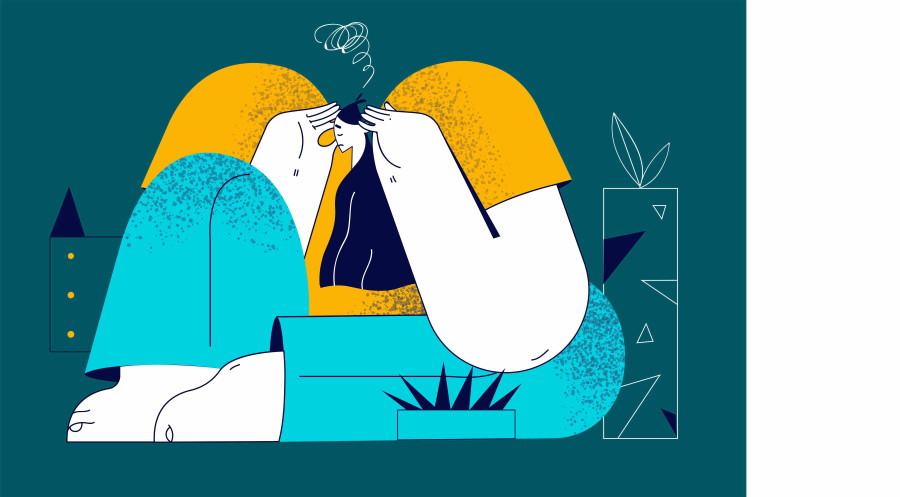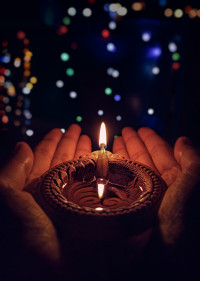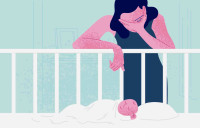As it is
The to-do and not-to-do list
Whenever my migraine creeps in, I know things are over for me.
Srizu Bajracharya
Every time it happens, I repeatedly tell myself, “mind over body, mind over body, mind over body, not now, spare me, please.” Like an unwanted guest, my migraine drops by whenever it wants to and has no fixed visit frequency.
Last month, it occurred so frequently (every three to five days) that I couldn’t make up my mind over what was causing it—dehydration, stress, oranges, hunger, the sun, bright lights, vehicular smoke, crowd, winter or perhaps because of frowning too much.
This severe headache disorder runs in my family; my mother and my elder sisters have all been suffering from this tormenting headache. In the past, we would take turns massaging each other’s eyes and heads. One time, when one of my elder sisters was having a painful migraine episode, I rubbed her head for almost an hour and ended up leaving my finger marks on her forehead.
And by now, it is no news when I suffer a headache. Two years ago, I was in Janakpur to cover an art event in the town and write stories about the festival and the people behind it. It was a dream assignment for someone who had always wanted to travel across the globe to write stories. On my second day in Janakpur, I woke up with a pulsing ache in my left eye. I tried my best to ignore it, but later in the day, when I was riding a rickshaw with a friend and heading to the venue where the art festival was happening, the full force of the migraine hit me. I had a throbbing headache, and I knew that my day’s plans for the day were going down the drain. I tried to stay calm, but when the pain became unbearable, I began worrying about not being able to attend the event. Seeing my face turn pale and red, my friend advised me to return to the hotel and take a rest.
With the throbbing pain also came nausea, and midway, I had to ask the driver to pull over so that I could throw up. I was at my breaking point—my eyes filled with tears and my nose runny. I kept thinking that I was never going to be able to do anything in life. I was devastated.
That afternoon in my dreams, I kept seeing myself not being able to reach places on time and not finishing my writing assignments. When I woke up, I was sweating, and adding to my misery, my migraine still had not passed.
Determined not to let the migraine deter me, I headed to Janaki Mandir that evening to watch the women from the Musahar community perform Jhijhiya with pots on their heads. The neon lights placed at the temple pricked my eyes, and I found the swarming crowd overwhelming. To make matters worse, a wave of nausea began to engulf me again.
Soon after the performance was over, I headed back to the hotel, but the rickshaw dai was in a chatty mood. I, too, wanted to ask him about Janakpur, but the more I spoke, the sicker I felt, and when the rickshaw pulled over at my stop, I vomited acidic water (having been on an empty stomach). Feeling sorry about my condition, a didi I befriended on the journey rubbed my head. That migraine episode lasted for three full days.
I can recount countless such occasions when a migraine episode had thrown a wrench into my personal and professional commitments. Whenever my migraine comes creeping in, I know things are over for me. I have become my family’s buzzkill because of my headaches—attending big gatherings is one of the many things that trigger my migraine. So every time my family or friends talk about meeting people or attending events, I slowly remove myself from such conversations. Strong perfume is another thing that triggers my migraine, and that means events where people come looking and smelling their best are a big NO for me.
As an introvert, I do not mind giving up attending social events. However, it starts getting tricky when simple things I love to do (like staying under the warm sun and eating warm oranges, bread with peanut butter, sweet and creamy cakes, travelling on a sunny day, staying up till the wee hours of the morning) also trigger my migraine. So the only time I do these things are on holidays and in the evenings because if my migraine decides to come along, I can go to bed.
On most days, I carry around a to-do and not-to-do list, not of goals and aspirations for life but about how to avoid migraines. The first on the list is never to be on an empty stomach. Always eat on time. The list also features avoiding oily food on an empty stomach, saying no to coffee, mayonnaise and nuts, avoiding car and bus rides, scented candles and incense sticks, claustrophobic spaces.
The to-do list is more about coping with the sickness I have. The list includes—staying hydrated and exercising (no matter how short of a duration), wearing sunglasses in the sun, wearing masks or rubbing Sancho on my nose whenever I smell strong scented perfumes, breathing in and out when feeling stressed, avoiding situations that make me anxious and staying away from people and crowds.
This list is my reality, and to avoid these debilitating migraine episodes, I do my best to stick to the list.
My mother, who with her age now suffers fewer migraine episodes than she used to, says the triggers are all in my head and that instead of fearing the things that trigger my migraine, I need to try to accept the way things are. “You are making it harder on yourself. Let go of things, and you will do just fine.” But the mantra doesn’t always work, so I live with a persistent dread of having a migraine.
The days are fortunate when the pills I take work and magically keep pain at bay. But on days when they do not work, a migraine episode leaves me stranded on a highway of unyielding pain, often incapable of doing anything.
However, the worst is when I get stuck in the in-between of the migraine episode.
This is a phase wherein the migraine has already been triggered, but because I had already taken a painkiller, the headache doesn’t come in the same urgency as it otherwise does. So, I am left in limbo, not knowing whether the migraine is coming or not. In this phase, I do get a headache, but this is not the 'right' headache. I know it’s complex, but those who suffer from migraine will relate to what I am saying here.
When I was younger, I had difficulty describing my headache. But with the many episodes of migraine that I have had over the years, I am getting better at articulating the headache caused by migraine. It’s a ticking, throbbing pain at first that starts from the eye and spreads over the head. Sometimes, it starts from the back and spreads till one eye feels heavy and droopy.
These days, I also have migraines right before or during my period. This trend started after a doctor I visited asked me if I had gotten migraines before my periods. Maybe I started noticing its frequent arrival only after that.
Until a few months ago, I relied heavily on analgesic medications like paracetamol and ibuprofen to subside my migraine. At every inkling of a migraine, I popped these pills, but when the headaches became more frequent, I learnt that the medications I used no longer had the same effect they once did. So now, when I am anxious about a headache, I just let it pass.
My mother and elder sister always ask if I drank enough water when I tell them that I have a terrible headache. Their questions and suggestions come from a good place, but the truth is that for people who have migraines, the episode comes at you no matter what. No matter how many times you try to postpone it with medicines, that bad headache will arrive when it has to, and the cause sometimes is irrelevant.
So, there are days when I just try to get on with the day, even with my head throbbing. I try my best to keep my balance when my deadline feels more substantial and when I feel the need to be more responsible. Other times, I am more lenient with myself. I say to myself, “It’s okay if you cannot reach the finish line today. You can try better another day.”
These days, every time my migraine starts to manifest, I slow down and decide what is crucial for me. I only take as much as I can, and I give up being too hard on myself. I don’t like to limit myself, and although I feel like people might think that I am making excuses and I am not trying hard enough, I try not to let myself feel burdened.
Bargaining for rest has always been emotionally conflicting.
Writing that message that I cannot be somewhere because of my migraine is still as difficult as going through a migraine episode. But these days, I feel less bad about drafting that message.
But it would be a lie to say I don’t wake up from my migraine feeling defeated and miserable. I did, I do, and I guess I always will. However, I am much better at handling the pain it brings and picking myself up again when it finally leaves. Yet, I can never tell if my newfound strength will last. On my worst days, I know I am going to break down again.




 15.95°C Kathmandu
15.95°C Kathmandu








.jpg&w=300&height=200)

